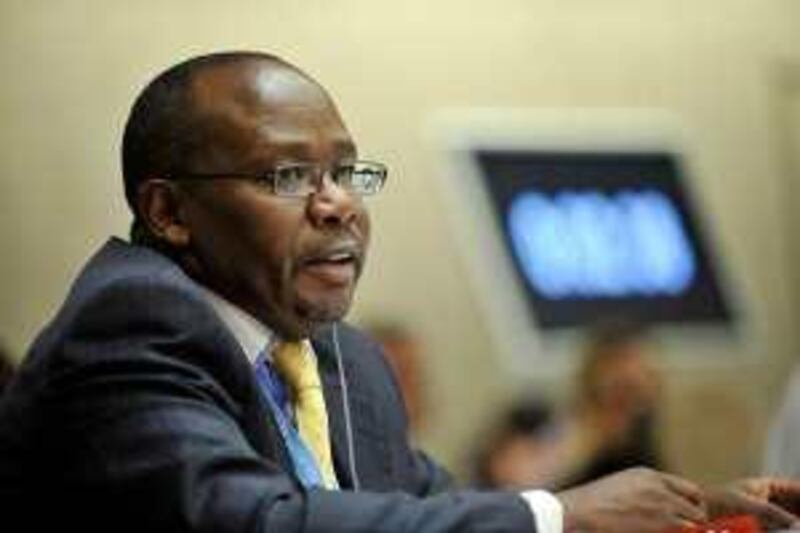ABU DHABI // The first visit by a UN special rapporteur to the UAE later this year will focus on racism and racial intolerance. Githu Muigai is due to travel here in his capacity as the UN special rapporteur on contemporary forms of racism, racial discrimination, xenophobia and related intolerance.
During his visit, which is expected to last up to two weeks, Mr Muigai, a Kenyan human rights lawyer who was appointed to the UN position last August, will meet representatives from government bodies and non-governmental organisations, academics, victims of alleged abuses and others. He said the "fact finding" visit would be followed by a report assessing racism in the UAE. However, the fact of the visit does not indicate that the UN has identified racism as prevalent in the UAE.
All special rapporteurs produce a report following country visits, which are then submitted to the UN's Human Rights Council, where they are discussed by member states and the country in question. "The Government of the UAE has indeed been generous to extend an invitation for me to visit the country this year," Mr Muigai said by e- mail. "We are currently discussing mutually convenient dates for the mission, which I expect will take place in the fall."
To date, none of the UN's 30 independent human rights experts or working groups have visited the UAE. The Government extended the first invitations earlier this year. The visits take place only upon invitation by the state in question, although they can be requested by the special rapporteurs, with the aim of assessing the human rights situation on the ground. In an address before the UN's HRC in Geneva in March, Dr Anwar Gargash, the Minister of State for Foreign and Federal National Council Affairs, confirmed that the trips were being planned.
"Official invitations have been sent to special rapporteurs on the sale of children, child prostitution and child pornography, as well as contemporary forms of racism, racial discrimination, xenophobia and related intolerance," he said in his speech at the UAE's Universal Periodic Review (UPR), a UN human rights review carried out every four years. Mr Muigai's visit is among the first action initiated by the UAE in response to recommendations by the UPR last December.
A spokesman for the UAE's UPR committee said it represented a chance for "constructive criticism and advice". "We of course welcome such a visit and are committed to that and the other pledges made in Geneva during the UPR process," the spokesman said. "The visits of the special rapporteurs open another constructive channel of communication with the Human Rights Council." Most of the rapporteurs specialise in a global theme such as violence against women, torture or the right to education, which they analyse, advise on and highlight during country visits.
Mr Muigai's mandate is to focus on issues within the "broad umbrella of racism", from racial discrimination to xenophobia and intolerance. "My key objective as special rapporteur is to engage constructively with host governments," he said. "In undertaking country visits, I will aim not only to monitor the overall situation of racism in each individual country, but also to make concrete recommendations that can be helpful and constructive for member states in their attempt to address this universal problem."
Mr Muigai said his report on the UAE was likely to be presented at the HRC session in June 2010. The reports generally contain details of the visit, as well as conclusions and recommendations directed at the government and other relevant parties. "The scope of issues I can look at is quite large," Mr Muigai said. "In all the countries that I visit, I am particularly interested about questions such as legislation to combat all forms of racism, the situation of vulnerable groups - including racial, national or ethnic minorities, migrants, refugees and asylum seekers."
At a labour and human rights conference in Dubai in April, Renaud Detalle, of the Office of the High Commissioner for Human Rights, reiterated the call to have special rapporteurs visit the UAE, saying that the Government could make use of international expertise to tackle labour issues such as living conditions. According to documents released by the agency, the special rapporteurs on education and trafficking made a request to visit in 2005, but neither expert received an invitation. Mr Muigai asked to visit in 2008, and the invitation was extended in February this year.
Other countries in the region have already received visits from UN special rapporteurs. In 2006, the human trafficking expert visited Oman and Qatar, and in 2008 the special rapporteur on violence against women travelled to Saudi Arabia. There are several other requests pending for Saudi Arabia. zconstantine@thenational.ae






